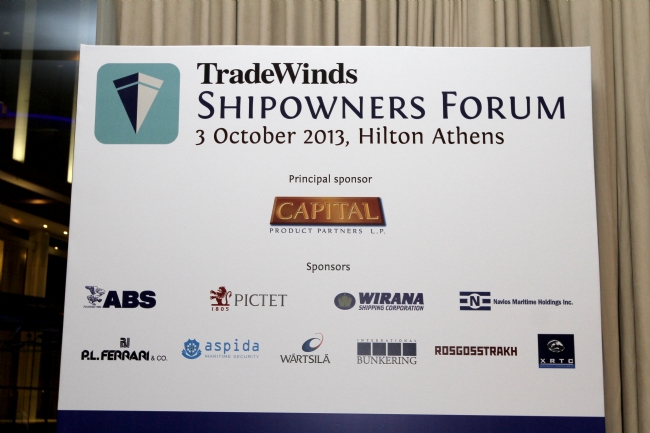Changing Course
Share this blog
Latest Maritime Vacancies
Business Development – Shipmanagement – Dubai
Office Manager – London
Shipping Paralegal – London
Shipping Manager – Singapore
Office Administrator – London
The king is dead! Long live the king!

This was the title of the third and final panel discussion at this year's TradeWinds Shipowners Forum on 3 October in Athens.
A panel of shipowners, operators and the inimitable Richard Fulford-Smith from Platou debated why the market crashed so far and discussed the opportunities and lessons to learn going forward.
What Harry Vafias described as "over-optimism", SwissMarine's Chris Connelly described as pure greed and Richard Fulford-Smith as fool's gold. He went on to say what my economics professor on the very first day of my shipping degree back in the 1980s said: "we don't learn the lessons." He is right of course. There is a massive rush to anticipate the next upturn at present, which Lazard's Peter Stokes described earlier in the day as foolish.
Having said that, there was certainly some debate about the wisdom of the current appetite for ordering new eco-ships. DVB's Dagfinn Lunde was wholeheartedly of the opinion that eco-ships are much better for the industry in so many ways but was at pains to point out that we simply don't need them at the moment. Richard Fulford-Smith however, was characteristically forthright and said that anyone that does not understand where the industry is going with eco-shipping simply isn't paying attention.
With new 11,000 teu container ships burning something like 90 tonnes of fuel a day at 18 knots, compared with 130 tonnes at 21 knots and 170 tonnes at 21 knots for older tonnage, you can soon see where he is coming from. The real trick for owners is making sure they get to share these benefits with the charterers.
Aristides Pittas, CEO of Euroseas, pointed out that one of the factors that caused the market to rise so high before the crash was shipyard scarcity. Earlier in the day Frank Dunne from Watson Farley and Williams pointed out that the environment is different this time because we now have massive shipyard capacity and huge pressure to build. Will this artificially inflate the order book and cause us to make the same mistakes again or will the banks' unwillingness or inability to lend temper things?
Certainly, it seems likely that many banks especially those in Germany and Greece are unlikely to play the significant role in the market going forward that they have traditionally done. During the second session of the day, Peter Stokes said that we must be getting closer to a proper mark–to–market which will see significant write-downs having to be absorbed and potentially seriously threaten some of the lending institutions. The presence of private equity investors obviously goes some way to fill the gap but will these players, whose main motivation often seems simply to be the fact that shipping assets are presently cheap, and who generally look for a 3-5 year return, be here for the long term?
Quite apart from freight rates, asset values and questions of supply and demand, Chris Connelly pointed out that the barriers to entry have been far too low. That and poor vetting of counter parties arguably led to many suffering the losses they did. His fellow panellists mostly agreed with John Platsidakis, MD Anangel Maritime Services (and the current Intercargo Chairman), going on to call for an evaluation/rating system for charterers to prove their credit-worthiness. Chris Connelly agreed this would be great, but felt that it would never happen in practice. He did go on to say that the industry should make contract re-negotiations public so that everyone can see who the good guys and bad guys are. Richard Fulford-Smith was so enthusiastic about the idea that he was very keen for those present to take it further.
Of course it makes sense; shipowners and shipmanagers are constantly put through the wringer by their customers and vetted in so many ways until the pips squeak. In contrast, charterers, many of whom have no assets and weak balance sheets, have to demonstrate very little.
In a final flurry to finish an excellent event session, George Chalos asked the panellists what scares them the most. John Platsidakis said it is the ignorance of European politicians who don't understand the benefits of shipping. Chris Connelly said "timing". Fair enough Chris – it is after all the art of a good joke, a good chat-up line and a good or bad business decision. Harry Vafias feared water ballast treatment systems which cost $1 million per ship to fit and new emissions regulations.
Finishing on a softer note when asked what scares him, befitting of a member of the OSCAR campaign board, Richard Fulford-Smith perhaps mellowed by his many years in shipping, said simply "the things we cannot manage – the health and wellbeing of our families and friends."
For photos of the event, please visit the TradeWinds Shipowners Forum Flickr page.